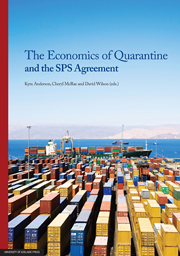Book contents
- Frontmatter
- Contents
- List of tables, figures and boxes
- Acronyms
- Preface
- List of contributors
- 1 Introduction
- PART I The multilateral rules under WTO
- PART II The ‘appropriate level of protection’
- PART III Adding more economics to risk analysis
- PART IV Specific health and environmental risks from trade
- PART V Conclusion
- 19 Summing up
- APPENDIX The legal text of the SPS Agreement
19 - Summing up
from PART V - Conclusion
Published online by Cambridge University Press: 05 June 2013
- Frontmatter
- Contents
- List of tables, figures and boxes
- Acronyms
- Preface
- List of contributors
- 1 Introduction
- PART I The multilateral rules under WTO
- PART II The ‘appropriate level of protection’
- PART III Adding more economics to risk analysis
- PART IV Specific health and environmental risks from trade
- PART V Conclusion
- 19 Summing up
- APPENDIX The legal text of the SPS Agreement
Summary
Acceptance of the SPS Agreement is increasing as its provisions and their implementation become familiar. In the three SPS cases so far taken to dispute settlement, however, little attention has been given to economic considerations, which allowed a legalistic approach to dominate proceedings. The debate on ‘The Economics of Quarantine’ is about reducing the imbalance between drawing on physical sciences, yet ignoring economic science in the application of the SPS Agreement.
The SPS Agreement mandates a scientific assessment of potential risks to human, animal and plant life or health associated with imported commodities. Public perceptions of these risks are often at variance with scientific assessments, which cause political tensions and complicate decisions about the ‘appropriate level of protection’ (ALOP). It is argued in the preceding chapters that risk assessments should include economic analysis and the trade effects of quarantine regulations (e.g., Chapter 3, by Nunn).
The case for cost/benefit analysis (CBA)
By taking account of both benefits and costs, economists uses CBA to provide consistent assessments and to rank policy alternatives. The SPS Agreement in its present form is selective, neglecting consumer interests and other benefits from de-restricting trade, while focusing on the risks and costs from relaxing quarantine protection. (The word ‘benefits’ does not appear anywhere in the SPS Agreement.)
- Type
- Chapter
- Information
- The Economics of Quarantine and the SPS Agreement , pp. 387 - 396Publisher: The University of Adelaide PressPrint publication year: 2012

